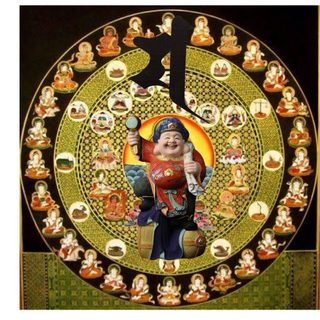大黒天(摩利支天と同一種子)梵名をマハーカーラといい、「大いなる暗黒」との意味があります。
わが国では七福神の一つに数えられ、頭巾をかぶり、大きな袋を背負い、右手に打出の小槌を待
った姿で親しまれています。
しかし、本来は、シヴア神の化身とされ、戦闘をつかさどるほか、冥府の神ともされています。仏教では施福の神として寺院の台所にまつられ、僧侶たちが食べ物の心配をしないで修行に励かことができように、必要なものが手にはいるように寺院を守護します。
大黒天を食厨の柱にまつったところから、家をささえる最も太い柱や一家のあるじを「大黒柱」というようになりました。一般には福徳の神として、商売繁昌などを祈念します。
おん ま ら か きや や そわ か

Daikokuten
Originally one of the main gods of Hinduism, it is another name for Shiva (Daijuten) as a destructive god with a dark blue body, and it entered Buddhism. Translated from the Sanskrit word Mahākāla, it is a transcription of Mahakala. Mahakala means great black god, great time (= destroyer). In esoteric Buddhism, he loves Sanbo in the genus of the heavens, and is a god who enriches food and drink. It is put in the department. One of the Seven Lucky Gods.
In southern China, he sat on a shogi and had a gold bag, and was enshrined in the kitchens of various temples. Daikokuten in Japan is of this lineage, and it is said that it was brought about by Saicho and was enshrined around the temple of the Tendai sect. After that, he became one of the Seven Lucky Gods from the guardian deity of the kitchen, wearing a hood, carrying a large bag on his left shoulder, and holding a gavel in his right hand. Become a figure. Not only merchants who wish for prosperous business, but also farmers are worshiped as the god of rice fields. The Tendai sect and others worked to disseminate it to the private sector, but it can be said that the major factor was that it was accepted together with Okuninushi no Mikoto because of its similar phonology and appearance. In addition, it seems that the entertainer of Daikoku Mai, who saw prosperity in the early modern period, also played a major role. It is popular with names such as Daikoku Pillar, and in the Tohoku region, an event is held in December to offer bifurcated radishes, which is called the old age of Daikoku.
It was introduced to Japan with the introduction of esoteric Buddhism, and was one of the guardian gods of Buddhism called Tenbe. What was emphasized and enshrined was passed on to Japan. Since it was introduced through esoteric Buddhism, it was worshiped mainly in the Shingon sect and Tendai sect in the early days. In India, it was also regarded as the god of the kitchen and dining room, but in Japan, Saicho enshrined the three-sided Daikoku, which was combined with Bishamonten and Benzaiten, as the guardian deity of the kitchen of Enryakuji Temple on Mt. Hiei. Later, he learned from Okuninushi. In the Muromachi period, it was actively worshiped in the Nichiren sect. It is popular as "Mr. Daikoku".
Daikokuten
Daikokuten (the same seed as Marici) is called Mahakala, which means "great darkness".
Counted as one of the Seven Lucky Gods in Japan, he wears a hood, carries a large bag on his back, and waits for a gavel to launch in his right hand.
It is familiar with its appearance.
However, originally, it is considered to be an incarnation of the god Shivaa, and in addition to being in charge of battle, it is also regarded as the god of the Netherworld. In Buddhism, the god of blessing is enshrined in the temple kitchen and protects the temple so that the monks can practice without worrying about food and have what they need.
From the place where Daikokuten was enshrined in the pillars of the food kitchen, the thickest pillars that support the house and the pillars of the family came to be called "Daikokuten". Generally, as a god of good fortune, we pray for business prosperity.
Onmaraka Kiya or Sowaka
【このカテゴリーの最新記事】
-
no image
-
no image
-
no image
-
no image
-
no image





